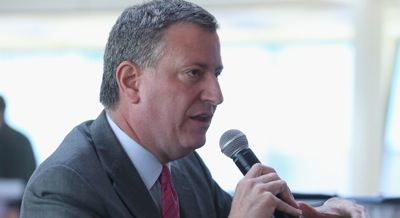Mayor De Blasio lobbied for a permanent extension
[Commentary]
Parents and caregivers of public school students, community residents who want a better quality of life, businesspeople who want competent workers, seniors wanting safer streets – everyone has a stake in improving the public education system.
And everyone needs to get off the couch and get involved in the unfinished political business now taking place – quietly, with little public debate – in Albany.
By the end of June, the current New York City schools governance structure will sunset. The legislature and Governor will decide whether or not, and for how long the Mayoral control system should be extended. Supporters of this structure argue that the system gives unambiguous authority, responsibility, and political accountability to the Mayor.
Opponents argue that the education function is too important to be left to the personal political agenda of any elected official. They point out that parent and community involvement in decision-making was the main casualty of the governance structure. Notwithstanding former Mayor Michael Bloomberg’s ineffective attempts to lessen the “achievement gap,” promises of accountability were never delivered.
Indeed, while Mayor Bill De Blasio has much more support in the community, his education report card should be graded “incomplete” and “needs improvement” at best. He and chancellor Carmen Farina have yet to unveil the long-promised “plan” to provide a world class education to the non-white majority of public school students.
Under the pre-Mayoral control governance system, the Mayor had significant influence, but an appointed Board of Education had the power to hire the Chancellor and to determine education policy. Elected community School Boards hired the District Superintendent.
Under the present system, the Mayor appoints the Chancellor, has a relatively powerless appointed Panel for Education Policy (PEP), and determines policy unilaterally. The elected local school boards were replaced with Community Education Councils (CEC) relatively powerless advisory bodies selected by a small group of parent volunteers in each school.
Late last month, the Governor sought to include the Mayoral control extension as part of the budget approval process. This forced the political decision makers to reveal their initial positions on the issue.
Governor Andrew Cuomo wanted a three-year extension to the legislation, Mayor De Blasio lobbied for a permanent extension, and Assembly Speaker Carl E. Heastie wanted a seven- year extender. The Republican-controlled State Senate, often a Cuomo supporter on education issues, has delayed announcing its position.
It has called for the mayor to justify an extension by sharing his plans to improve failing schools. Lacking agreement on the issue, the governance structure question was left out of the budget approval process. The issue must be resolved by the end of the current school year.
This delay creates an opening where regular New Yorkers have a chance to impact the decision process, however unlikely the chances are. Business in the state capital is conducted with little public participation, transparency, or consideration of alternatives. The “three men in a room” expression accurately captures the closed nature of Albany decision making.
And despite the importance of this issue to the future of our community – the children are our future – there has been far too little public engagement.
Where are the town hall meetings, public hearings, position papers on this process? Where is the public education on the achievements and failures of mayoral control? With more than 10 years of mayoral control, no public office – the state Chancellor, the Regents, the Mayor, the City Schools Chancellor, the Assembly persons, Senators, and so forth, has done a comprehensive study of this policy.
If Black Lives Matter, or if a mobilized community intends to make them matter, one first step will be calling your legislator and demanding that public engagement on this issue take place before they vote on the question.












